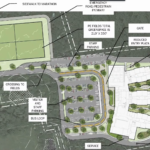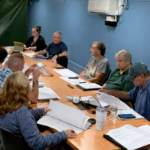On Tuesday night, eHop held its 11th annual Know Your Vote forum at the HCAM studio to help prepare residents for Annual Town Meeting on May 1.
The forum is one of eHop’s efforts to increase government transparency by providing factual information about key issues in town. A panel of town leaders explained several upcoming articles and answered residents’ questions. Elise Mihajloski, eHop’s president, moderated the hour-long forum.
A return to its usual setting
Town Moderator Ellen Rutter explained that Town Meeting during the past few years had been held in different locations due to the challenges of the pandemic.
“This year we’re back in our old stomping ground of the middle school auditorium,” she said. If there is an overflow of people, they can congregate in the gym across the hall. A quorum of 128 members is needed for votes to be held. Last year, it was challenging to maintain a quorum, which extended Town Meeting to three nights.
Rutter added that a consent agenda may be used to expedite considering articles that are not expected to generate debate. Town Clerk Connor Degan explained that a consent agenda would also include consideration of “noncontroversial housekeeping things” which would expedite voting on them. There is the ability to pull an item from the consent agenda if it warrants further consideration.
Degan also explained that some items, particularly regarding zoning, require a two-thirds vote rather than a simple majority. Making sure that the two-thirds threshold is met, he said, is important to ensure the town’s bond rating and to get bylaw changes approved from the attorney general’s office.
Several citizens’ petitions will be voted on this year, Degan noted. At least 10 registered voters needed to sign off on a proposed article in order for it to be added to the warrant.
“It’s a chance for voters to actually make sure that the issues they think are important are heard,” he said.
Citizens’ petitions
The most widely discussed citizens’ petitions were the two put forward by resident Peter LaGoy, who is the chair of the Trails Coordination and Management Committee (TCMC) but submitted them as a private citizen. Article 47 calls for the disbanding of the Upper Charles Trail Committee and reconfiguring it as a TCMC subcommittee, with UCTC’s funding shifted to that subcommittee if approved. The other, Article 48, requests that public funds no longer be spent on the controversial proposed Segment 7 of Hopkinton’s Upper Charles Trail, which as currently proposed would run along and cross busy Hayden Rowe Street.
“The idea would be to keep the trail moving forward,” LaGoy explained. “It would just be a different governing body that would do that.”
One online question regarding Article 47 asked how to ensure what was termed “lost public trust” issues would not be repeated under a new iteration of the group.
“The Trails Coordination and Management Committee was set up in large part to address concerns from citizens about trails into going into folks’ backyards,” LaGoy said as he gave a historical overview. He noted that procedures are in place to consider residents’ issues.
A citizens’ petition regarding prohibiting outdoor shooting at gun clubs was discussed by resident Seetharaman Ganesan. He described how the gun shots disturbed him and motivated him to put forth the article to protect “we the people, babies, animals and birds” from noise pollution. However, there are concerns about the legality of this proposal even if it passes.
Net zero carbon emissions
Another issue that was raised was regarding the town’s plans for reaching net zero carbon emissions. Geoff Rowland, chair of the Sustainable Green Committee, explained that the committee is spearheading the efforts for a net zero resolution as well as a climate action plan. The committee has met with several town boards and committees to share its vision, including the School Committee, the Zoning Advisory Committee and the Planning Board.
Said Rowland: “Part of the motivation for the net zero resolution is to give these committees and these departments a formal reason for setting net zero as a priority long term” by the end of 2024.
While costs are a factor, he added that there is a higher upfront expense but lower future operational costs. He did not quantify an amount at this meeting.
PILOT agreement for Wilson Street
Select Board member Mary Jo LaFreniere addressed a payment in lieu of taxes (PILOT) agreement for the Wilson Street solar farm. She explained that a PILOT agreement is used to gain a benefit from entities such as businesses and private schools that are not subject to paying taxes. This helps to mediate any benefits they receive from the town, such as trash pickup and emergency services.
“To be clear for the residents’ benefit, the proponent who is entering into this agreement with the town will be paying the same taxes as they would under normal circumstances,” added Town Manager Norman Khumalo. “The driver behind this agreement was purely for the developer’s financing needs.”
The agreement would allow the developer to show “a more predictable pattern for paying taxes.”
Sidewalk construction
A question raised asked why sidewalks are needed and why they cost so much.
“I think we’ve been hearing from citizens for decades now that they want safe places to walk,” said Planning Board Chair Gary Trendel.
The Planning Board conducted a pedestrian connectivity survey last year to learn how to best integrate the needs of walkers into the town’s infrastructure. There was a public information session last month. He noted that while the need for sidewalks repeatedly has been expressed to the board, articles regarding new sidewalks tend not to pass at Town Meeting.
“What we found is first and foremost, people are very concerned with safety,” Trendel added. “And unfortunately there have been some events in the past where people have been seriously injured and worse in town.”
An interesting statistic he noted from the survey was that 85% of the respondents were looking for walking loops of between 2 and 4 miles that can be linked and combined for walking and running. They would benefit physical and mental health across age ranges.
Cost estimates from the Department of Public Works show that the cost of a sidewalk is $170 per linear foot, including design and construction. Article 15, which proposes a new sidewalk for Chestnut Street, is estimated to cost $515,000.
Hopkins School debt exclusion
Superintendent Carol Cavanaugh explained that Hopkinton’s student population is continuing to grow, spurring the need for an $800,000 addition to the Hopkins School.
She noted that a demographer for the Massachusetts School Building Authority (MSBA) is predicting that there will be 802 students by 2030 if it continues to be a school for Grades 4 and 5. If it includes Grades 5 and 6, as is part of the district’s plan, it is estimated to hold 803 students. There are about 670 students there currently.
The article is for funding for the design and permitting of the addition, added HPS Business Administrator Susan Rothermich. The new area would include a cafeteria, which would allow the current gym to take over the existing cafeteria. She described a “ripple effect” because the additional classrooms would require code compliance for the cafeteria and kitchen.
Affordable housing and inclusionary zoning bylaw
Trendel discussed the proposed inclusionary zoning bylaw. He said that the underlying reason for the bylaw is to ensure that Hopkinton continues to have at least 10% of housing be affordable. If that percentage were to dip, developers would be able to build projects by right with an “unfriendly 40B” that might otherwise not conform with Hopkinton’s current bylaws.
He added that the bylaw also would ensure that the community is economically and socially diverse.
The article proposes to change affordable housing from requiring a special permit to a by-right use. This would allow future housing to be counted toward the requirement set under the MBTA Communities law passed last year for cities and towns that benefit from MBTA public transit services. It also would lower the minimum threshold for affordable housing units from 10 to five. Under the article, a payment in lieu of meeting the affordable housing requirement would require approval of a special permit.
Electric vehicle charging stations
Trendel also discussed an article pertaining to having infrastructure for electric vehicle charging stations for future buildings that have five or more parking spaces. This need arose due to the rise in purchases of electric vehicles in order to get ahead of this trend.
Khumalo added that another article on the installation of at least three electric charging stations was proposed by a high school student as part of the participatory budget process.
“It was solidly supported by town staff,” he said. The potential locations have not yet been determined.






















On gun club issue. You dont like it move stop wasting the towns time